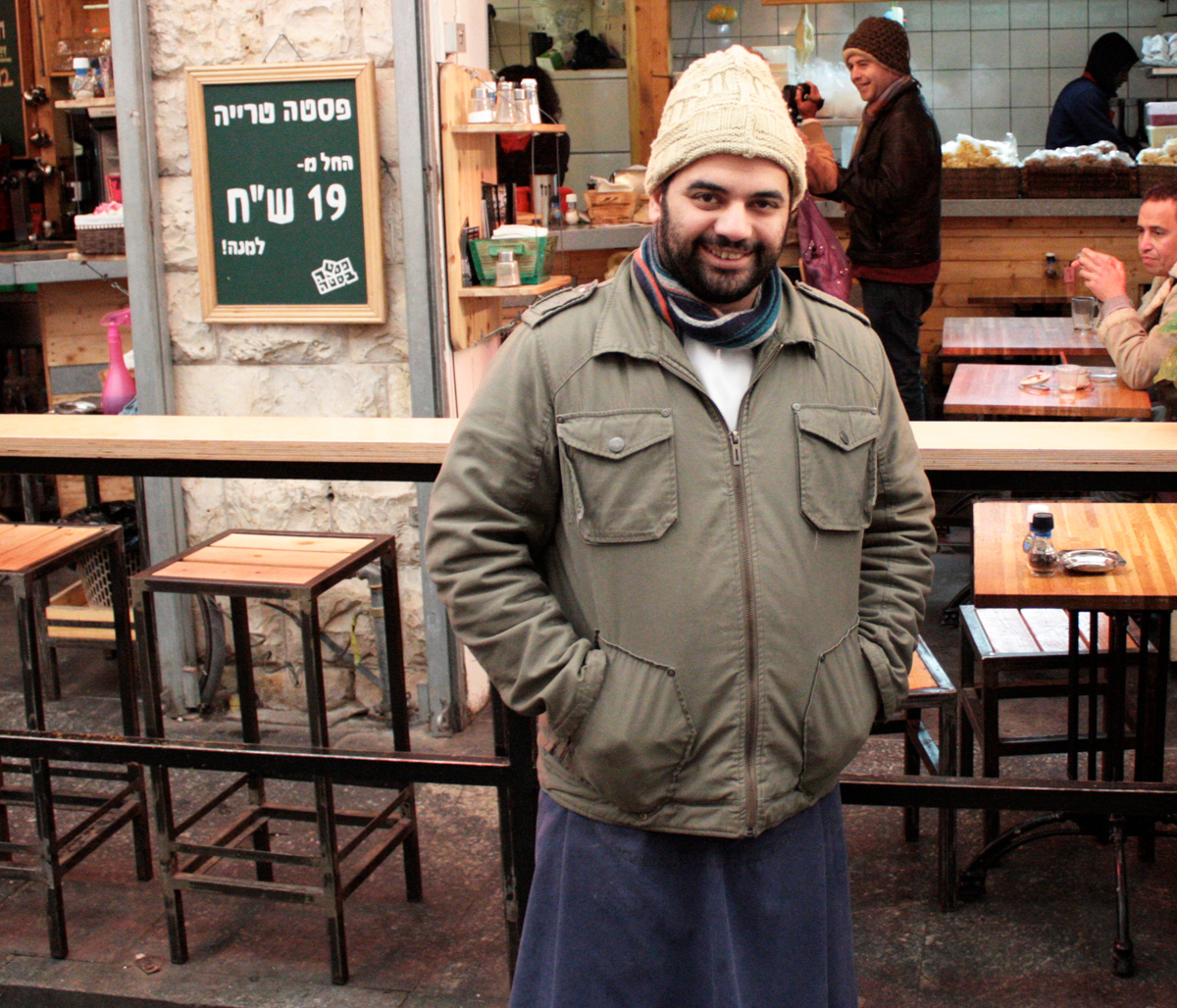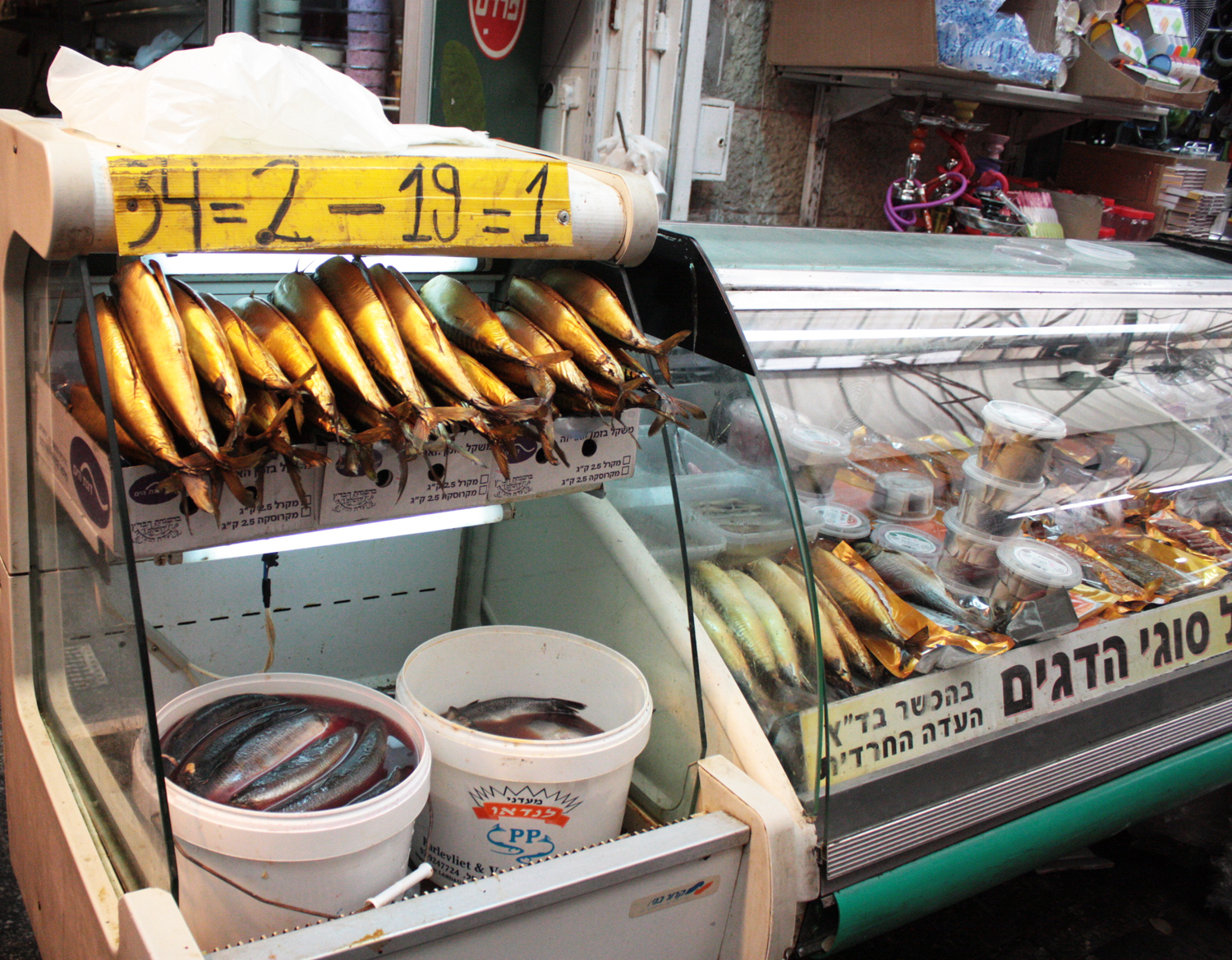Jerusalem: Exploring Machane Yehuda Market With Chef Uri Navon
 Uri Navon is chef-owner of Machneyuda, a restaurant that pulls ingredients from Jericho, Bethlehem, Nablus and Ramallah.[/caption]
Uri Navon is chef-owner of Machneyuda, a restaurant that pulls ingredients from Jericho, Bethlehem, Nablus and Ramallah.[/caption]
 Navon buys specialty smoked fish on Friday mornings.[/caption]
Navon buys specialty smoked fish on Friday mornings.[/caption]
Unexpected snowflakes kept tumbling down on the dark beard of chef Uri Navon, one of the owners of Machneyuda, a contemporary Mediterranean restaurant in Jerusalem. It was January and the ancient city was preparing for what would be a historic snowstorm. But before the shops could close due to weather, the bearded chef headed to the nearby Machane Yehuda Market to go food shopping.
"For the restaurant we get all of our fruit, vegetable, dry products and special ingredients only here in the market," said the chef, adding that the name of the restaurant, which he owns with chefs Yossi Elad and Assaf Granit, is a direct homage to the famous bazaar. "Due to its location, we get ingredients from Jericho, Bethlehem, Nablus and Ramallah — it's one of the advantages of being inside Machane Yehuda Market."
For over 100 years, the market has served not just as inspiration for chefs, but for the neighborhood as well. It's Israel's oldest marketplace in a residential area, and on any given day, especially the weekends, hundreds of merchants set up shop, and thousands of people come through. Here you can find fresh fish, bright produce, bins of tea, piles of mushrooms, cosmetics, skin care and plenty of spices, which proved the subject matter of our first stop.
Right at the edge of the market we hit up a merchant selling sacks of dried herbs, bags of rice and aluminum bowls brimming with fresh-ground spices and various blends of herbs, seeds and dried vegetables. These mixes, the merchant explained, get thrown into the rice as it cooks to impart depth and zest. With blends including dried onion with quinoa, flax seeds with coriander and pumpkin seeds, these toppers are like the gourmet, Israeli version of Rice-A-Roni, minus the box.
Next, we stumbled on to Abu Dauod, one of the oldest booths in the market. The owner, simply called Moshe, served us tiny plates of pickled fish, briny olives and a shot of anis liquor, all while a cigar dangled from his lips. Moshe's father opened the shop in 1936, just a couple decades after the market first appeared, and eventually, he passed it down to his son.
"I buy my olives and special types of smoked fish usually on Friday mornings when I'm passing by or doing my morning market tour," said Navon, before popping one of the bright green olives in his mouth. "This place gives an authenticity that you cannot find anywhere else."
This is why Navon and his partners shop in the market for their daily menu, to bring local and clean flavors to the open kitchen at Machneyuda — whether it's for a traditional dish or with their daily changing, more innovative fare like the comically named "fish tartare doing synchronized swimming" or the "return of the semolina cake with tahini ice-cream."

Though the neighborhood remains heavily religious, the restaurant isn't kosher since they serve meat alongside dishes with dairy. It creates controversy sure, said Navon on the sly, so they do close on the Sabbath. Aside from food, Machneyuda is one of the best places to get a drink in the neighborhood too, as they have a full bar and sell an assortment of beverages, from Israeli wines like Yarden's Blanc de Blanc to French vino to American whiskey. Surprisingly, they also offer a decent list of single malt scotch.
After visiting Moshe, we passed dozens of stands brimming with multiple kinds of olives, including fresh ones that, if you are unfortunate enough to sample, taste bitter and old — not like the bright and briny types most of us are accustomed to. After making sure they really did taste that bad, we chased the astringent flavor from our mouths with some strawberries that proved so bright and ruby red, they looked fake. Luckily, they didn't taste bogus, and instead, in the middle of January, our tasted buds experienced something that only that flavor a super ripe, just-picked berry could provide.
To further wash away the taste of un-cured olive, we popped into a juice and cosmetic shop for a shot of Khat, a stimulating leaf they like to juice. After, as we passed other stalls, one sporting an array of tomatoes, another with cartoon candies, and a cooler filled with bug-eyed fish, Navon smiled, waved and shook hands with the merchants.
"I love the market for its diversity, the colorful people, the one of a kind ambiance and the fact that we have a designer shop next to a fish stall and a small pasta restaurant," said Navon. "Its character is scattered in our personal lives and in Jerusalem heritage."
More food market stories on Food Republic:

